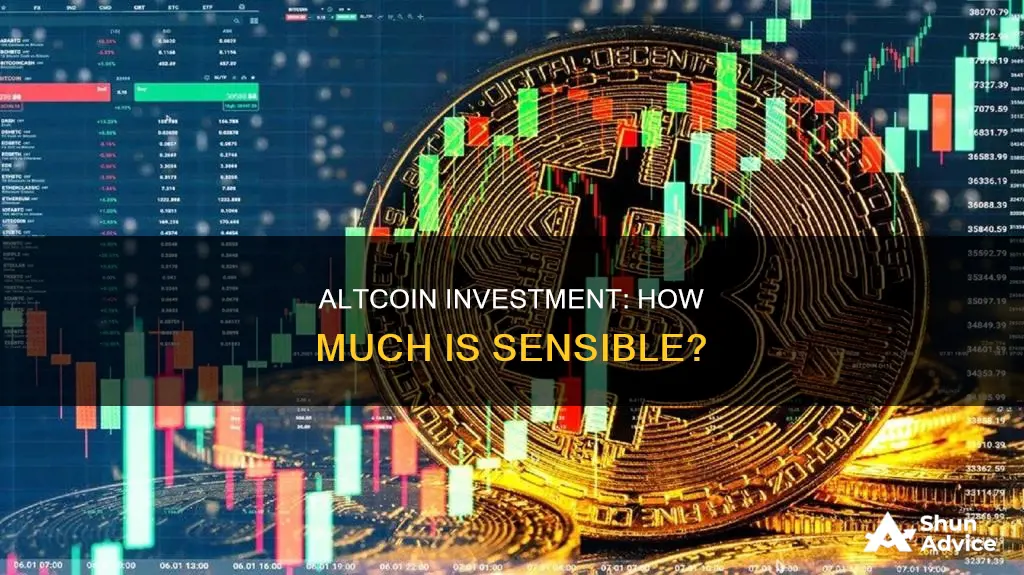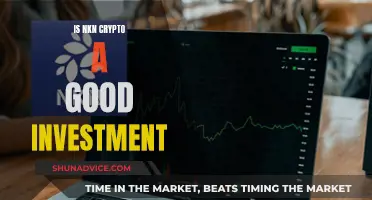
Altcoins are any cryptocurrency that is not Bitcoin, and sometimes not Bitcoin or Ethereum. There are thousands of altcoins on the market, including Ethereum, Uniswap, Dogecoin, Litecoin, Shiba Inu Coin, and Cardano. Altcoins can be thought of as variations of Bitcoin, created by developers to improve functionality or add features that are not present in Bitcoin.
When deciding how much to invest in altcoins, it's important to be aware of the risks. Altcoins are generally considered to be a high-risk, high-reward investment. The cryptocurrency market is largely unregulated, and altcoins can be extremely volatile, with sudden price swings and the potential for significant losses. There is also a risk of scams and rug pulls, where developers abandon a project and leave with investors' funds.
It's recommended that investors approach altcoins with caution and conduct thorough research before investing. It's also important to only invest money that you can afford to lose.
| Characteristics | Values |
|---|---|
| Definition | Altcoins are any cryptocurrency other than Bitcoin and, to some, Ethereum. |
| Purpose | Altcoins are created to improve the functionality of Bitcoin or add features that are not present in Bitcoin. |
| Examples | Ethereum, Shiba Inu Coin, Dogecoin, Litecoin, Uniswap, Cardano, Chainlink, Polkadot, Binance coin, etc. |
| Risks | Altcoins are considered highly risky and speculative investments. They are extremely volatile, susceptible to scams and "rug pulls", and may have low liquidity. |
| Benefits | Altcoins can offer high potential returns, diversification, innovative use cases, and early investment opportunities. |
| Research | It is important to research the underlying technology, market trends, growth potential, risks, and volatility before investing in altcoins. |
| Investment advice | Investors should only invest in altcoins with money they can afford to lose. |
What You'll Learn

Altcoins vs. Bitcoin: differences, pros and cons
Altcoin is a term derived from "alternative" and "coin", referring to any cryptocurrency that is not Bitcoin (and, to some, Ethereum). There are thousands of altcoins on the market, each with its unique features and purposes. Some popular examples include Ethereum, Ripple, and Litecoin.
Differences Between Bitcoin and Altcoins
Bitcoin is the first and most popular cryptocurrency, created to act as a decentralised digital alternative to money. Altcoins, on the other hand, often introduce new technologies and functionalities beyond simple transactions. For instance, Ethereum enables the creation of smart contracts, which are self-executing contracts with predefined conditions.
While Bitcoin primarily focuses on being a decentralised digital currency, enabling secure and anonymous peer-to-peer transactions, altcoins may focus on high transaction speeds or providing new functionality. Altcoins often aim to address perceived limitations in Bitcoin's design.
Pros and Cons of Bitcoin
Bitcoin has a lower risk due to its larger market capitalisation and longer track record. It is widely recognised and accepted, making it easier to buy, sell, and use. Many investors also view Bitcoin as a digital store of value, similar to gold. However, Bitcoin experiences significant price volatility, which can be unsettling for investors. It also has limited functionality compared to altcoins and may not offer the same range of features.
Pros and Cons of Altcoins
Altcoins offer the potential for high returns, as some have experienced massive price increases. They also introduce innovative technologies and features, driving advancements in various industries. Investing in altcoins allows for diversification beyond Bitcoin. However, altcoins carry higher risks, especially those with smaller market capitalisations, and are more susceptible to price fluctuations. Many altcoins are also less established, with less recognition and adoption, making it challenging to predict their long-term potential.
When deciding between Bitcoin and altcoins, there is no one-size-fits-all answer. Bitcoin offers stability, recognition, and wider adoption, while altcoins provide opportunities for innovation and potentially higher returns. It is important to carefully weigh the pros and cons of each before making an investment decision.
Are Bitcoin Fees Tax Deductible as Investment Costs?
You may want to see also

How to invest in altcoins: a step-by-step guide
Step 1: Understand the risks
Altcoins are a risky and speculative investment. They are highly volatile and susceptible to scams and "rug pulls". It's important to only invest what you can afford to lose.
Step 2: Do your research
Before investing in any altcoin, it's crucial to conduct thorough research. Understand the underlying technology, market potential, and risk factors. Ask yourself: What problem does this altcoin solve? Is decentralisation necessary for the project to operate? Who are the core developers and founders? How many coins will be minted and are in supply?
Step 3: Choose an exchange
There are many cryptocurrency exchanges to choose from, each offering different features and supporting different altcoins. Some popular options include Binance, Coinbase, Crypto.com, eToro, Gemini, and Uphold.
Step 4: Fund your account
To purchase altcoins, you'll need to fund your account on the chosen exchange. You can typically do this by connecting your bank account via wire transfer or credit card, or by sending cryptocurrency from another wallet.
Step 5: Make your purchase
Once your account is funded, you can start investing in altcoins. Keep in mind that altcoins are a high-risk, high-reward investment, so it's important to approach them with caution and a well-informed strategy.
Step 6: Secure your assets
If you're investing for the long term, it's important to secure your assets. This includes setting up a strong password, enabling two-factor authentication, and backing up your wallet's seed phrase.
Step 7: Consider diversifying
To further reduce risk, consider diversifying your investments across multiple altcoins and base coins such as Bitcoin and Ethereum.
Remember, investing in altcoins is a risky endeavour and it's important to do your own research before committing any funds.
A Beginner's Guide: Investing Bitcoin in the UAE
You may want to see also

Altcoin volatility: risks and rewards
Altcoins are alternative cryptocurrencies to Bitcoin. They are built on blockchain technology and include tokens like Ethereum, Uniswap, Dogecoin, and thousands of other cryptocurrencies.
Altcoins can be extremely volatile, with sudden price swings and the potential for significant losses. They are also highly speculative and are considered to be among the riskiest of cryptocurrencies. Their value doesn't correspond to an underlying source of value, such as real estate or profits, making it almost impossible to predict whether they will go up or down.
However, altcoins can also offer much higher returns than traditional investments due to their volatility and the potential for rapid price increases. They can be a good way to diversify an investment portfolio, and they often have unique use cases and technologies that can benefit investors and businesses.
If you are considering investing in altcoins, it is important to do your research and understand the risks involved. Here are some key points to keep in mind:
- Only invest what you can afford to lose. Cryptocurrency investing is high-risk and unregulated, making it susceptible to scams and "rug pulls".
- Research the problem the altcoin is trying to solve. If you can't figure out its use case, it probably doesn't add much value to the market and may not be sustainable in the long term.
- Consider the reputation and credibility of the founders and developers of the altcoin project. Anonymous development teams or a lack of information about the team are red flags.
- Understand the supply and growth potential of the altcoin. A cheap cryptocurrency doesn't necessarily have more room to grow than a more expensive one. Know the maximum supply and the number of coins currently in circulation.
- Choose an exchange that offers a wide variety of altcoins and is secure and transparent. Binance, Coinbase, and Gemini are popular options.
- Consider the size of the altcoin's market cap and the magnitude of price swings. Smaller market cap altcoins tend to be more volatile than larger market cap coins.
- Be prepared for high volatility. Even if you choose high-quality altcoins with strong fundamentals, the rises and falls tend to be much more volatile than those of Bitcoin.
Remember, investing in altcoins is a high-risk, high-reward proposition. Always do your own research and invest cautiously.
TheStreet's Guide to Investing in Bitcoin
You may want to see also

Altcoin market saturation: the long-term outlook
The altcoin market is currently saturated, with thousands of altcoins available and more being added every day. This makes it challenging to determine which altcoins have long-term potential and will survive in the market. The future of altcoins is uncertain, but there are some key considerations and strategies that can help investors make informed decisions.
Firstly, it's important to understand the purpose and value proposition of an altcoin. Ask yourself: What problem does this altcoin solve? If you can't identify a clear and meaningful problem it addresses, it's likely that the project doesn't add much value to the market. While coins that solve trivial problems may still appreciate in the short term, their long-term sustainability is questionable.
Secondly, assess the need for decentralisation in solving the identified problem. Blockchains are slow, power-intensive, and challenging to operate. Therefore, consider whether decentralisation on a blockchain is truly necessary for the project's success. If not, the altcoin may be a quick money-grab with little long-term potential.
Additionally, conduct thorough due diligence on the development team behind the altcoin. Reputable projects will be transparent about their team members and their qualifications. Anonymously developed altcoins or those without a credible team should be approached with caution.
When evaluating an altcoin's investment potential, consider factors beyond its current price. The number of coins minted or in circulation, along with the maximum supply, can impact an altcoin's price dynamics. A low price doesn't necessarily indicate more room for growth compared to more expensive coins.
It's also crucial to recognise the risks associated with altcoin investing. Altcoins are highly volatile and carry a higher level of risk compared to more established cryptocurrencies like Bitcoin and Ethereum. The altcoin market is largely unregulated, making it more susceptible to scams and "rug pulls". As a result, investors should only allocate capital they are comfortable losing.
Lastly, diversification is a key strategy in the altcoin market. Investing in a range of solid altcoin projects with strong use cases and innovative technologies can help lower overall risk. This approach allows investors to benefit from the high potential returns of altcoins while mitigating the impact of any single project's failure.
In summary, the long-term outlook for the altcoin market involves careful research, risk management, and diversification. Investors who approach this saturated market with caution and a well-informed strategy can potentially capitalise on the high-risk, high-reward nature of altcoin investing.
Bitcoin Investment: What's in it for You?
You may want to see also

Altcoin regulation: the future of decentralised finance
Altcoin Regulation: The Future of Decentralized Finance
The rise of altcoins and their growing popularity has brought with it a host of regulatory challenges. Altcoins are any cryptocurrencies that are not Bitcoin, and sometimes not even Ethereum. With thousands of altcoins on the market, it is difficult to tell which are legitimate and which are not.
The regulatory landscape for altcoins is complex and constantly evolving. While some countries have embraced the technology, others have banned it outright. The lack of consistent regulation across jurisdictions makes it difficult for investors to know what they are getting into when investing in altcoins.
One of the main challenges of regulating altcoins is the decentralized nature of the technology. Many altcoins are built on blockchain technology, which is designed to be decentralized and distributed across a network of computers. This makes it difficult for regulators to enforce any rules or restrictions on the creation or use of altcoins.
Another challenge is the global nature of the cryptocurrency market. Altcoins can be traded across borders, making it difficult for any one country or regulatory body to exert control over the market. This has led to a fragmented regulatory landscape, with different rules and requirements in different jurisdictions.
To address these challenges, some experts have proposed the idea of "embedded regulation," where regulatory requirements are built directly into the design of the altcoin platform. This would allow for automatic compliance monitoring and enforcement, potentially reducing the need for traditional regulatory bodies. However, this approach raises its own set of questions and concerns, particularly around accountability and enforcement.
In the meantime, investors should proceed with caution when investing in altcoins. The volatile nature of the market, combined with the lack of clear regulation, means that there is a high risk of losing money. It is important to research any altcoin before investing and to only invest what you can afford to lose.
While the future of altcoin regulation is uncertain, it is clear that some form of regulatory framework is needed to protect investors and provide clarity to the market. Whether this will take the form of traditional regulation or a more innovative approach like embedded regulation remains to be seen.
The Dark Side of Bitcoin: Investing Risks Revealed
You may want to see also
Frequently asked questions
Altcoins are any cryptocurrency that is not Bitcoin or, in some definitions, Bitcoin and Ethereum. They are alternative versions of Bitcoin, created by developers to improve functionality or add features.
To invest in altcoins, you need an account with a cryptocurrency exchange. Some exchanges let you trade altcoin-bitcoin pairs, meaning you can buy and sell altcoins using bitcoin. Most crypto exchanges support at least some altcoins, but the types of altcoins available differ depending on the exchange.
Altcoins are considered highly risky and speculative investments. They are extremely volatile, with sudden price swings and the potential for significant losses. The cryptocurrency market is largely unregulated, making it more susceptible to scams. Altcoins may also have low liquidity, making it difficult to sell them quickly.
Altcoins can offer much higher returns than traditional investments due to their volatility and potential for rapid price increases. Investing in a range of altcoins based on solid projects can diversify an investment portfolio and reduce overall risk. Altcoins often have unique use cases and technologies that provide new possibilities for investors and businesses.
Given the high risks associated with altcoins, it is recommended to only invest what you can afford to lose. Approach altcoins with caution and conduct thorough research before investing, including understanding the underlying technology, market potential, and risk factors.







